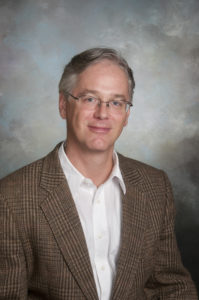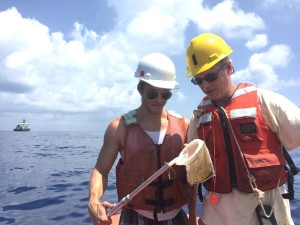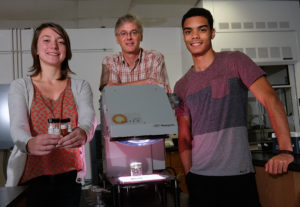Charlie Sharpless had a problem to solve. He was finishing his post-doctoral fellowship and wasn’t quite sure where to go next. He loved teaching and conducting research, but there were few positions at large research universities where he could mix these two elements.
But at the University of Mary Washington, he found the perfect chemistry.

As a professor and chair of the Department of Chemistry, Sharpless combines equal parts teaching, advising and research to make new discoveries in environmental chemistry and educate the next generation of scientists and industry leaders. Now he is being honored with the Distinguished Research Award by the Virginia section of the American Chemical Society at its annual award ceremony in Richmond on Thursday, March 21.
“I’ve never done research thinking about awards – it’s always been strictly for the enjoyment – but it’s an honor to be recognized, particularly for the success I’ve had working with my students over the years,” said Sharpless, who came to UMW in 2004 after earning a Ph.D. in analytical chemistry from Duke University and a B.A. in natural sciences from Johns Hopkins University.
For the last two decades, Sharpless has studied environmental aquatic photochemistry, exploring the chemical reactions that happen when sunlight is absorbed by dissolved organic matter in the water. He’s discovered that simple measurements – such as the “brown-ness” of the water – can make accurate predictions about the rates of contaminant degradation.
“I’m trying to understand how fast pollutants go away in the environment when the sun is shining,” said Sharpless, who has taken samples from clean bodies of water such as rivers, lakes and coastal marine systems, and studied the photochemistry that takes place during oil seeps and spills.

His work with collaborators at the Woods Hole Oceanographic Institution in Massachusetts led to an opportunity to study the effects that photochemistry had on degrading oil in the Deepwater Horizon spill in 2010. Sharpless and Matt Walters ’16 later traveled to the Gulf of Mexico to capture oil samples. Their research, which was funded by the National Science Foundation, has provided scientific insight to the federal government and industry leaders who are responsible for cleaning up after environmental disasters.
“Dr. Sharpless has always pushed me to be a curious and driven researcher,” said Orlando Stewart Jr. ’15, who assisted Sharpless in the lab with the Gulf of Mexico project. He is now pursuing a Ph.D. in chemistry at Georgetown University. “Not only has the research we conducted together opened my eyes to the impacts of chemical processes on the world, but my many cherished memories with Dr. Sharpless have highlighted the even greater impacts chemists as individuals can have.”
July Laszakovits ’16, with whom Sharpless published a paper, said he gave her tools that have helped her succeed in her doctoral studies at Ohio State University. “I came into graduate school with the skill set to conduct lab work efficiently and design my own experiments, which few incoming graduate students know how to do.”

Earlier in his career, Sharpless worked with the Environmental Protection Agency and water utilities to discover how ultraviolet radiation can be used to disinfect and destroy contaminants in drinking water. And he’s also studied how photochemistry affects the breakdown of pharmaceuticals that flow from wastewater plants to rivers.
“Charlie’s work is first rate and internationally known, and it was done with undergraduate researchers,” said Janet Asper, associate professor in chemistry. She nominated her colleague for this award, explaining that research at smaller colleges and universities tends to go unrecognized in comparison to the work being done at large research institutions. “I felt that the Virginia community of chemists needed to know about the truly exceptional work he has done here at UMW.”
While Sharpless is eager to “jump back into the brown water” and research with his current students once the Jepson Science Center expansion is complete, he acknowledges that he couldn’t have earned this award without the significant contributions of his former students.
“All of my students formed a great team over time to advance the work that I’m being recognized for with this award.”